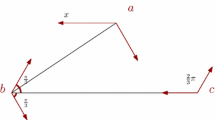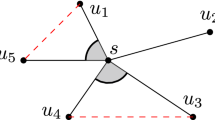Abstract
A tree structure is often used in wireless sensor networks to deliver collected sensor data to a sink node. Such a tree can be built using directional antennas as they offer considerable advantage over the omni-directional ones. A tree is adequate for data gathering from all sensor nodes as long as no node in the tree fails. Since the connectivity of the tree is one, failure of any one node disconnects the tree and may disable the sink node from collecting data from some of the sensor nodes. In this paper we study the problem of enhancing the fault tolerance capability of a data gathering tree by adding a few additional links so that the failure of any one sensor would not disconnect the tree. Assuming that the addition of each link to the tree involves some cost, we study the problem of least-cost augmentation of the tree, so that even after failure of a single node, all the surviving nodes will remain connected to the sink node. We prove that the least-cost tree augmentation problem is NP-complete. Moreover, we provide an approximation algorithm with performance bound of two. The experimental evaluations of the algorithm demonstrate that the approximation algorithm performs even better in practice and almost always produces near-optimal solution.
Access this chapter
Tax calculation will be finalised at checkout
Purchases are for personal use only
Preview
Unable to display preview. Download preview PDF.
Similar content being viewed by others
References
Incel, O., Krishnamachari, B.: Enhancing the data collection rate of tree-based aggregation in wireless sensor networks. In: Secon (2008)
Li, X.Y., Wang, Y., Wang, Y.: Complexity of data collection, aggregation, and selection for wireless sensor networks. IEEE Transactions on Computers 60, 386–399 (2011)
Kranakis, E., Krizanc, D., Williams, E.: Directional Versus Omnidirectional Antennas for Energy Consumption and k-Connectivity of Networks of Sensors. In: Higashino, T. (ed.) OPODIS 2004. LNCS, vol. 3544, pp. 357–368. Springer, Heidelberg (2005)
Yu, Z., Teng, J., Bai, X., Xuan, D., Jia, W.: Connected coverage in wireless networks with directional antennas. In: INFOCOM (2011)
Wang, Y., Cao, G.: Minimizing service delay in directional sensor networks. In: INFOCOM (2011)
Balanis, C.A.: Antenna Theory: Analysis and Design, 2nd edn. Wiley (1997)
Bredin, J.L., Demaine, E.D., Hajiaghay, M., Rus, D.: Deploying sensor networks with guaranteed capacity and fault tolerance. In: MobiHoc (2005)
Hajiaghayi, M., Immorlica, N., Mirrokni, V.: Power optimization in fault-tolerant topology control algorithms for wireless multi-hop networks. IEEE/ACM Transactions on Networking 15, 1345–1358 (2007)
Pishro-Nik, H., Chan, K., Fekri, F.: Connectivity properties of large-scale sensor networks. Wireless Networks 15(7), 945–964 (2009)
Wang, F., Thai, M., Li, Y., Cheng, X., Du, D.Z.: Fault-tolerant topology control for all-to-one and one-to-all communication in wireles networks. IEEE Transactions on Mobile Computing 7, 322–331 (2008)
Cardei, M., Yang, S., Wu, J.: Algorithms for fault-tolerant topology in heterogeneous wireless sensor networks. IEEE Trans. Parallel Distrib. Syst. 19(4), 545–558 (2008)
Frederickson, G.N., Ja’Ja’, J.: Approximation algorithms for several graph augmentation problems. SIAM J. on Computing 10, 270–283 (1981)
Garey, M., Johnson, D.: Computers and intractability. A guide to the theory of NP-completeness. Freeman (1979)
West, D.B.: Introduction to Graph Theory, 2nd edn. Prentice Hall (2001)
Tarjan, R.E.: Finding optimum branchings. Networks 7, 25–35 (1977)
Author information
Authors and Affiliations
Editor information
Editors and Affiliations
Rights and permissions
Copyright information
© 2013 Springer-Verlag Berlin Heidelberg
About this paper
Cite this paper
Shirazipourazad, S., Sen, A., Bandyopadhyay, S. (2013). Fault-Tolerant Design of Wireless Sensor Networks with Directional Antennas. In: Frey, D., Raynal, M., Sarkar, S., Shyamasundar, R.K., Sinha, P. (eds) Distributed Computing and Networking. ICDCN 2013. Lecture Notes in Computer Science, vol 7730. Springer, Berlin, Heidelberg. https://doi.org/10.1007/978-3-642-35668-1_10
Download citation
DOI: https://doi.org/10.1007/978-3-642-35668-1_10
Publisher Name: Springer, Berlin, Heidelberg
Print ISBN: 978-3-642-35667-4
Online ISBN: 978-3-642-35668-1
eBook Packages: Computer ScienceComputer Science (R0)




